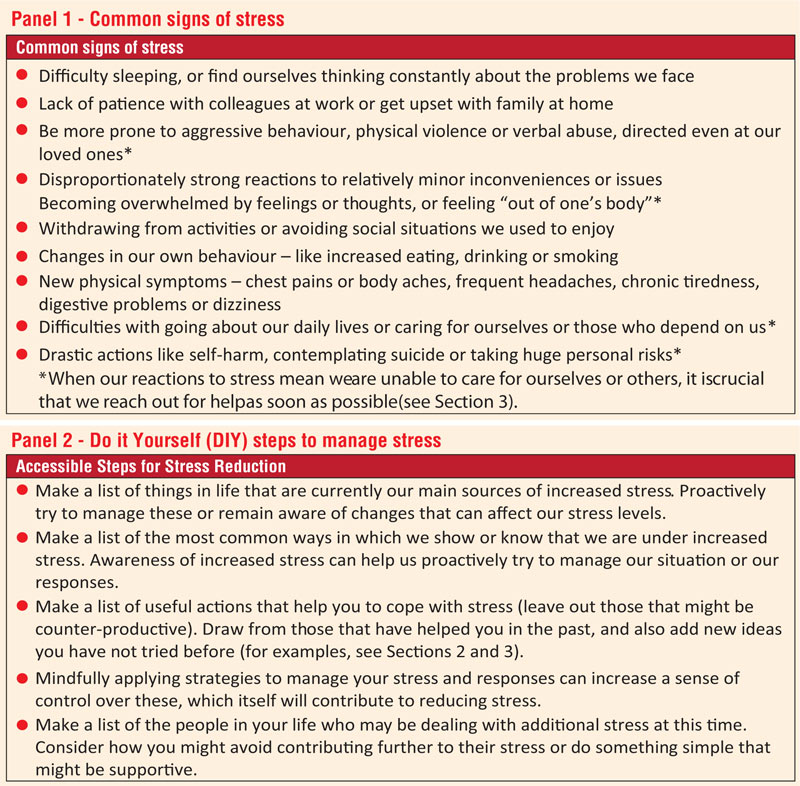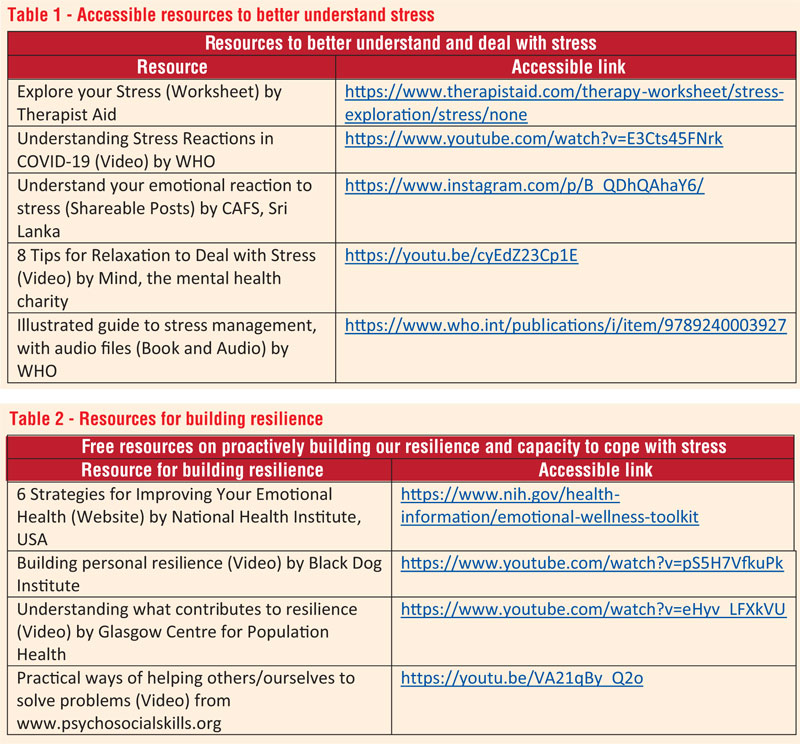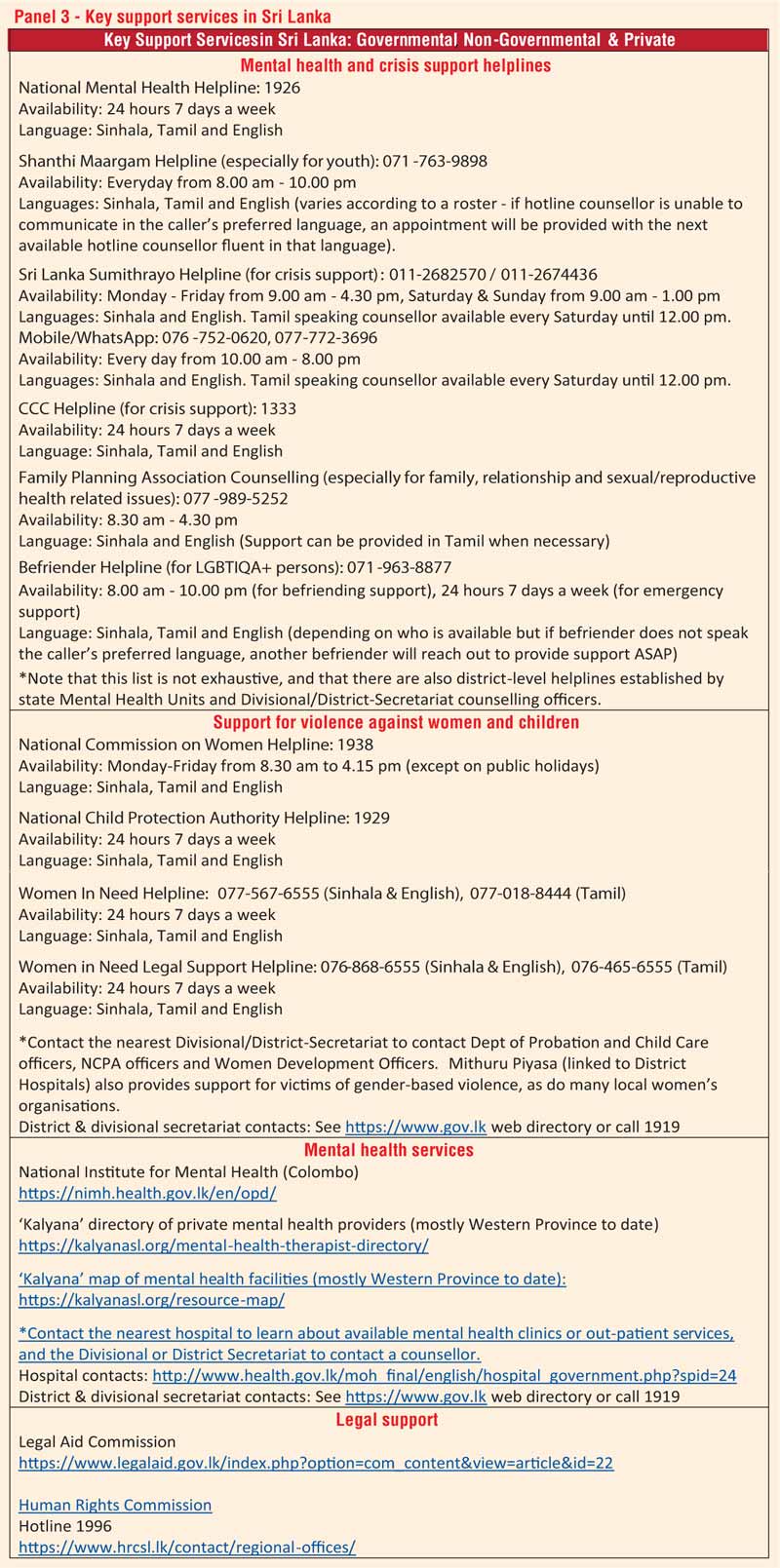Monday Feb 23, 2026
Monday Feb 23, 2026
Wednesday, 30 March 2022 01:48 - - {{hitsCtrl.values.hits}}

 These are difficult times for many of us in Sri Lanka. After two years of a pandemic that disrupted nearly every aspect of daily living, we are now going through a serious economic crisis with widening consequences. Many of the challenges from rising cost of basics, failing public utilities and the impending uncertainty are starting to feel very close, if they are not affecting our lives already.
These are difficult times for many of us in Sri Lanka. After two years of a pandemic that disrupted nearly every aspect of daily living, we are now going through a serious economic crisis with widening consequences. Many of the challenges from rising cost of basics, failing public utilities and the impending uncertainty are starting to feel very close, if they are not affecting our lives already.
Mental health professionals, public health specialists, and social workers anticipate significant impacts of the current socio-economic situation on individuals and families across all economic strata and communities in Sri Lanka. They recognise that these additional stressors do not only present difficulties in themselves, but they will add to the challenges that many people are already dealing with in their lives.
In this article, we hope to do three things: 1) remind ourselves to be aware of the signs of additional stress in our lives and those of others; 2) reflect on some of the actions we can all take to increase our psychosocial resilience in the face of increased stress; and 3) share some resources that are available for additional support whenever we might need it.
Watch out for stress reactions
Increased stress can stretch or overwhelm the social, mental and emotional resources that we use to cope with difficulties in our lives. This happens to all of us, but the signs that our ability to cope is compromised may vary from person to person, or situation to situation. Sometimes the signs of increased stress may be more visible at a collective level – with more frequent or heated conflicts or arguments in the household or workplace, or even on the street or in the neighbourhood.
The type or severity of our reactions may vary across a wide spectrum, but it is important to remember that experiencing such responses to increased stress is completely natural and can affect any of us regardless of age, gender, socio-economic status or background. Even those of us who are very good at coping with stressful situations can exhaust our resources at times, and indeed those who usually shoulder extra responsibilities in either our work or personal lives are not immune to the risks of ‘burnout’.
Becoming aware of these signs is key to managing stress well. Panel 1 provides some common examples of stress signs, and Panel 2 describes simple actions that we can take to manage stress in our own lives.
Invest in building psychosocial resilience
We don’t always have control over the circumstances of our lives, or the sources of our increased stress. For instance, the power to address the drivers of the current economic crisis or shape national agricultural policy may not be in our hands. However, even as we call for those in positions of responsibility to take action to address the problem and provide solutions to reduce the negative effects on citizens, we must also consider how to bolster our own capacity to best get through these hard times. Strengthening our psychosocial resilience to manage increased stress will contribute to our better coping with the various challenges we may be experiencing in life.
Being psychosocially resilient does not mean we will not be practically, emotionally or socially affected by difficulties such as job loss or violence, but rather that we have the (psychological) resources within ourselves and also (social) supports around us that enable us to endure such hardships and recover our sense of wellbeing in their aftermath. The composite term “psychosocial” is used to indicate that psychological and social resources are not independent, but rather that they constantly interact and influence each other.
Just as our circumstances and problems will be different, the resources that we possess internally and externally to be resilient to life challenges will also vary. Whilst it’s best to begin building resources before we feel overwhelmed or find ourselves really struggling to cope – it’s never too late to start! Here are some common things that we can all do proactively to bolster our resilience:
Monitor and manage our own thoughts, feelings, behaviour and bodily sensations: As we acknowledge our own responses to stress and become more aware of how or when these are affecting us, we can proactively adapt to cope better with sources of stress or difficulty or moderate our reactions. Regular practices like deep breathing, meditation, prayer or other calming activities can also help us manage our responses when we feel we may be coming under stress. Reflecting on what has worked for us in the past may be a good guide to strategies for the present, and we can also consider trying out new approaches.
Strengthen our social supports: We can take extra effort to stay connected to people who are important to us and who care about us. This can also include people who are compassionate and reliable, as well as those who are capable and resourceful. Participation in collective spaces, whether these are community meetings or religious congregations, can also be helpful – especially if these are kind and inclusive.
Proactively engage with our problems: We can try to access up to date information and connect with useful services that are relevant to the challenges we are dealing with. Making contacts within these or establishing good rapport with service providers can help ensure better access to available supports and may help us get support when we need it. Learning more about the problems we are facing from credible people or other sources can help us to respond better to these.
Identify when we are feeling overwhelmed and reach out: We can contact a trusted friend, social worker, or mental health professional who can assist us through that period of difficulty or can help us get the support we need (see Section 3 below).
Play our part in supporting others: We can also support others in our families and networks by extending social support and acknowledging the importance of managing increased stress at this time. With people who may benefit from our assistance financially, materially or practically, providing these forms of support appropriately and with dignity can also help buffer them from being overwhelmed.
Getting help from informal and formal supports
Many of us are not accustomed to asking for support from others, and especially from formal service providers. The reasons can be embarrassment, the feeling of not wanting to trouble others, shame or being considered weak due to prevailing social norms. However, it is important to note that strongest and most practical action that you can take is to seek assistance. Additional support can really make a difference in being able to endure or overcome problems. There are many sources of support to draw from, including the following:
a) Use our own networks: Think of people amongst our family, friend circles, colleagues, teachers and other circles whom we know to be kind, sensible, trustworthy and who might be willing to listen to our difficulties and help you think through how to deal with it. Go through our phone contact lists to review our contacts, if it’s hard to think of someone off the top of our heads. Consider speaking to them, at least as someone who would be able to understand what we are going through, who could explore options we might not have thought of yet, or who might be able to provide some moral or practical support to us.
b) Use the services that are available: Sri Lanka now has a range of mental health and social work supports that can be accessed for free or for a fee.
The State sector has a range of officers providing support to the public through the Divisional Secretariat and District Secretariat offices – including those who deal with child protection, violence against women, economic problems amongst others. We can speak with one of the counsellors about our problem, and they can help connect us with other relevant State service providers. Every district now has a general hospital with a mental health unit, and most Medical Officer of Health (MOH) areas have a regular clinic at which we can meet a mental health professional. The Legal Aid Commission also provides free advice and assistance to those who have problems that may require legal assistance.
There are many different not-for-profit organisations that provide support for economic, psychosocial, legal and other social problems. There are also many private mental health services provided through hospitals and counselling centres. Panel 3 provides a summary of services available – this list is not exhaustive.
If you have any additional contact details of services that you wish to suggest for inclusion in future lists like this, please do fill out this form: https://bit.ly/mhservicessrilanka.
Not all services and providers will give us the same type or quality of care. It can be useful to speak with someone we know who has received services previously to understand what to expect and if the support sounds suitable for us. Note that all mental health providers should follow ethical guidelines and practices (like https://www.srilnac.org/Home/CodeofEthics), and if you feel uncomfortable or worry they may be violating these, you should immediately seek support on how to respond to this from another unrelated mental health professional or someone you trust.
Beyond coping
Of course, the burden of coping with these multiple crises and stressors should not fall on individuals and families to bear alone. It is the role and responsibility of government and its institutions to address the national economic crisis and other systemic problems that are beyond the scope of private citizens’ actions. The Government must take special policy and programmatic measures to buffer the most vulnerable groups in our society against the unfolding effects of the crisis on their economic, social and psychological wellbeing. There is also a need to ramp up services for those who are worse affected, including in ensuring access to support for those of us who are struggling with social and mental health impacts.
However, as we face increasing socio-economic, political, and public health related challenges, we may not always receive the timely or effective support that we hope for. Therefore, it may be necessary for us to mobilise the resources we have available and promote a culture among ourselves of supporting each other, and especially those at greater risk. Coming together to respond to this crisis will help us personally and may also help us to grow as a community in which we value and care for one another. That will surely be a resource that would help protect us in hard times.


(Shashika Bandara is a doctoral student in global health policy at McGill University. He is formerly a Policy Associate at the Center for Policy Impact in Global Health at the Duke Global Health Institute.)
(Ananda Galappatti is a medical anthropologist and practitioner in the field of mental health and psychosocial support.)